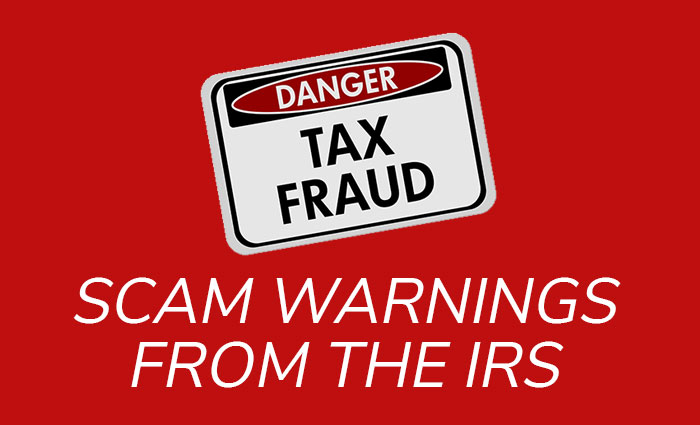
Taxpayers should be on the lookout for scams
With scam artists hard at work all year, taxpayers should be on the lookout for a surge of evolving phishing emails and telephone scams.
Taxpayers should watch for versions of two tax-related scams. One involves Social Security numbers related to tax issues. The other threatens taxpayers with a tax bill from a fictional government agency. Here are some details about these scams to help taxpayers recognize them:
The SSN Scheme
- The latest twist includes scammers claiming to be able to suspend or cancel the victim’s Social Security number. This scam is similar to and often associated with the IRS impersonation scam.
- It is yet another attempt by con artists to frighten taxpayers into returning robocall voicemails.
- Scammers may mention overdue taxes in addition to threatening to cancel the taxpayer’s SSN.
Fake Tax Agency
- This scheme involves a letter threatening an IRS lien or levy.
- The scammer mails the letter to the taxpayer.
- The lien or levy is based on bogus overdue taxes owed to a non-existent agency.
- The fake agency is called the “Bureau of Tax Enforcement.” There is no such agency.
- The lien notification scam also likely references the IRS to confuse potential victims into thinking the letter is from a legitimate agency.
Both these schemes show classic signs of being scams. The IRS and its Security Summit partners – the state tax agencies and the tax industry – remind everyone to stay alert to scams that use the IRS or reference taxes. Being alert is especially important in late spring and early summer as tax bills and refunds arrive.
Seven Tips to Prevent Tax ID Fraud
“Fraudsters are using very clever tactics to get access to your personal information and submit false tax claims,” says Rob Donnelly, Vice President & Security Officer at The Bank of Marion. “Consumers should be suspicious of any email, text or social media communication claiming to be from the IRS that requests personal information. Everyone should keep a watchful eye out for missing W-2s and be very careful with any mail that contains sensitive financial information.”
Tax identity fraud happens when a criminal files a false tax return using a stolen Social Security number in order to fraudulently claim a refund. Identity thieves generally file false claims early in the year and victims are unaware until they file a return and discover that a tax return has already been filed in their name.
Here are important tips to help consumers prevent tax ID fraud:
- File early. File your tax return as soon as you’re able giving criminals less time to use your information to file a false return.
- File on a protected WiFi network. If you’re using an online service to file your return, make sure you’re connected to a password protected personal network. Avoid using public network such as a WiFi hotspot at a coffee shop.
- Use a secure mailbox. If you’re filing by mail, drop your tax return at the post office or an official postal box instead of your mailbox at home. Some criminals look for completed tax return forms in home mailboxes during tax season. If you file by mail, we suggest you use certified mail, which provides a receipt of delivery for your records.
- Find a tax preparer you trust. If you’re planning to hire someone to do your taxes, get recommendations and do thorough research before handing over all of your financial information.
- Shred what you don’t need. Once you’ve completed your tax return, shred the sensitive documents that you no longer need and safely file away the ones you do.
- Beware of phishing scams by email, text or phone. Scammers may try to solicit sensitive information by impersonating the IRS. Understand that the IRS will not contact you by email, text or social media. If the IRS needs information, they will contact you by mail first.
- Keep an eye out for missing mail. Fraudsters look for W-2s, tax refunds or other mail containing your financial information. If you don’t receive your W-2s and your employer indicates they’ve been mailed, or it looks like it has been previously opened, contact the IRS immediately. If you believe you’re a victim of tax identity theft, or if the IRS denies your tax return because one has previously been filed under your name, alert the IRS Identity Protection Specialized Unit at 1800-908-4490.
In addition, you should:
- Respond immediately to any IRS notice and complete IRS Form 14039, Identity Theft Affidavit.
- Contact your bank immediately and close any accounts opened without your permission or tampered with.
- Contact the three major credit bureaus to place a fraud alert on your credit records:
- Equifax www.Equifax.com 1-800-525-6285
- Experian www.Experian.com 1-888-397-3742
- TransUnion www.TransUnion.com 1-800-680-7289
- Continue to pay your taxes and file your tax return, even if you must do so by paper.
More information about tax identity theft is available from the FTC at www.ftc.gov/taxidtheft and the IRS at www.irs.gov/identitytheft
Here is more helpful information to counter other threats to your security:
